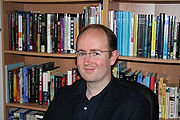
John Horgan (political psychologist)
Encyclopedia

Pennsylvania State University
The Pennsylvania State University, commonly referred to as Penn State or PSU, is a public research university with campuses and facilities throughout the state of Pennsylvania, United States. Founded in 1855, the university has a threefold mission of teaching, research, and public service...
. He is also Associate Professor of Psychology at Penn State and Affiliate Professor at the School of International Affairs.
Profile
He was awarded his PhDPHD
PHD may refer to:*Ph.D., a doctorate of philosophy*Ph.D. , a 1980s British group*PHD finger, a protein sequence*PHD Mountain Software, an outdoor clothing and equipment company*PhD Docbook renderer, an XML renderer...
(Applied Psychology) in 2000 by University College, Cork. While in Ireland, he spent several years conducting detailed research on Irish Republican movements, and published several articles (some of which appeared in the journal Terrorism and Political Violence) on the fundraising activities of the Provisional IRA. He is engaged in extensive research on involvement and engagement in terrorism, and his current research projects focus on issues of disengagement and de-radicalization from terrorist movements. Some of his research on this subject was published in a 2010 issue of the journal 'Terrorism and Political Violence'. Horgan has written several books on terrorism, and these include The Psychology of Terrorism (2005), and The Future of Terrorism (1999, with Max Taylor
Max Taylor (psychologist)
Maxwell "Max" Taylor is a Forensic and Legal psychologist who initially specialized in the study of terrorism and who subsequently became involved in the study of sex offenders, returning later to the study of terrorism.-Life and career:...
). His latest book Walking Away from Terrorism: Accounts of Disengagement from Radical and Extremist Movements was published by Routledge (New York and London) in 2009, and presents detailed fieldwork interviews Horgan has conducted with former terrorists in several countries. Horgan is involved in a long-term project on understanding the psychology of terrorist behavior and promoting the scientific study of terrorism.
He is a member of the Editorial Boards of the journals Terrorism and Political Violence, Studies in Conflict and Terrorism, Behavioral Sciences of Terrorism and Political Aggression, and the Journal of Investigative Psychology and Offender Profiling. He is Associate Editor of Dynamics of Asymmetric Conflict.
In 2006, Horgan became a recipient of an Airey Neave Trust Fellowship Award.
In 2010, following his consultancy work with the FBI's Behavioral Analysis Unit (BAU), he was appointed to the Research Advisory Board of the FBI's National Center for the Analysis of Violent Crime
National Center for the Analysis of Violent Crime
In November 1982, following a meeting between members of the Criminal Personality Research Project advisory board and other specialists, the concept of a single ' was put forward. This elite investigative branch was never envisaged as a replacement for traditional crime investigation by local law...
(NCAVC).
Horgan is a native of Castleisland, Co. Kerry, in the Republic of Ireland.
Books
Horgan, J. (forthcoming 2012). Divided We Stand: The Psychology and Strategy of Ireland's Dissident Terrorists. New York: Oxford University Press.Horgan, J. and Braddock, K. (2011)Terrorism: A Reader. London and New York: Routledge.
Horgan, J. (2009). Walking Away from Terrorism: Accounts of Disengagement from Radical and Extremist Movements. London and New York: Routledge.
Bjorgo, T. and Horgan, J. (Eds.) (2009). Leaving Terrorism Behind: Individual and Collective Disengagement. London: Routledge.
Horgan, J. (2005). Psychology of Terrorism. London: Routledge.
Taylor, M. and Horgan, J. (Eds.) (2000). The Future of Terrorism. London: Frank Cass & Co.
Selected Articles
Weine, S., Horgan, J., Robertson, C., Loue, S., Mohamed, A., & Noor, S. (2010). ‘Community and Family Approaches to Combating the Radicalization of US Somali Refugee Youth and Young Adults: A Psychosocial Perspective’. Dynamics of Asymmetric Conflict.Horgan, J. and Braddock, K. (2010). ‘Rehabilitating the Terrorists? Challenges in Assessing the Effectiveness of De-radicalization Programs.’ Terrorism and Political Violence, 22 (1), 1-25.
Horgan, J. (2009). ‘De-radicalization or Disengagement? A Process in Need of Clarity and a Counterterrorism Initiative in Need of Evaluation’, Revista de Psicologia Social, 24 (2), 291-298.
Bloom, M. and Horgan, J. (2008). ‘Missing their Mark: The IRA Proxy Bomb Campaign 1990’. Social Research: An International Quarterly of the Social Sciences. Special Issue: Martyrdom, Self-sacrifice, and Self-Denial, 75, 2 (Summer), 80-94.
Horgan, J. (2008). ‘From Profiles to Pathways and Roots to Routes: Perspectives from Psychology on Radicalization into Terrorism,’ ANNALS, American Association of Political and Social Sciences, 618, July.
Horgan, J. and Boyle, M. (2008). ‘A Case Against Critical Terrorism Studies’. Critical Studies on Terrorism, 1, 1, 51-64.
Roberts, K. and Horgan, J. (2008). ‘Risk Assessment and the Terrorist’, Perspectives on Terrorism, 2, 6, March, 3-9.
Selected Book Chapters
Horgan, J. (2010). ‘Disengaging from Terrorism’, in D.C. Canter (ed.). The Faces of Terrorism: Cross-Disciplinary Investigations. London: Wiley-Blackwell.Gupta, D., Horgan, J., and Schmid, A. (2010). ‘A Marriage Made in Hell? Terrorism and Organized Crime’. In D.C. Canter (ed.). The Faces of Terrorism: Cross-Disciplinary Investigations. London: Wiley-Blackwell.
Horgan J. (2009). ‘Individual Disengagement: A Psychological Perspective’, in T. Bjorgo and J. Horgan (Eds). Leaving Terrorism Behind: Individual and Collective Disengagement (Routledge: New York).
Boucek, C., Beg, S. and Horgan, J. (2009). ‘Opening up the Jihadi Debate: Yemen’s Committee for Dialogue’, in T. Bjorgo and J. Horgan (Eds). Leaving Terrorism Behind: Individual and Collective Disengagement (Routledge: New York).
Horgan, J. (2009). ‘Interviewing Terrorists: A Case for Primary Research’, in H. Chen, E. Reid, J. Sinai, A. Silke and B. Ganor (eds.), Terrorism Informatics: Knowledge Management and Data Mining for Homeland Security (Integrated Series in Information Systems). Springer.
Horgan, J. (2008). ‘Looking to the Future: Practical Alternatives to Predicting Tomorrow’s Terrorists’, in B. Bowden and M. T. Davis (Eds.) Terror: From Tyrannicide to Terrorism (Brisbane: University of Queensland Press), pp.282-297.

